‘I saw civilian cars shot with only one purpose - robbery’
Artem, tell us how you came to serve. You, unlike many of us, were preparing for a full-scale invasion, although you had no previous military experience.
It wasn't spontaneous: I had already gathered a package of documents for joining the Territorial Defence Forces, but I hadn't taken a photo. I was already looking at where to take it, I went to the military enlistment office before the full-scale invasion. And when it started, I went to the checkpoint with this package. The guys were shocked, because no one else had such a package: police clearance certificates, cardiac tests, etc. No one thought to take them in the first days of the war.
On the first day of the war, my wife woke me up at 5:00 a.m.: 'They're bombing us!' I said, 'Oh really?'.
I was on the last street in the direction of Bucha, Irpin and Hostomel, and I could hear explosions.
When I realised what had happened, I went to the military commissariat. They took my data and said: ‘We will call you back’. I understand that there was a lot of recruitment and they tried to take guys with experience. I have two degrees, but when I studied at the construction academy, there was no military department. Although I have worked in management positions all my life and have organisational skills.
Have you ever dreamed of being a military officer, perhaps as a child?
No, my dream was to be a builder. I have realised it, and I can be proud of the construction projects I create.
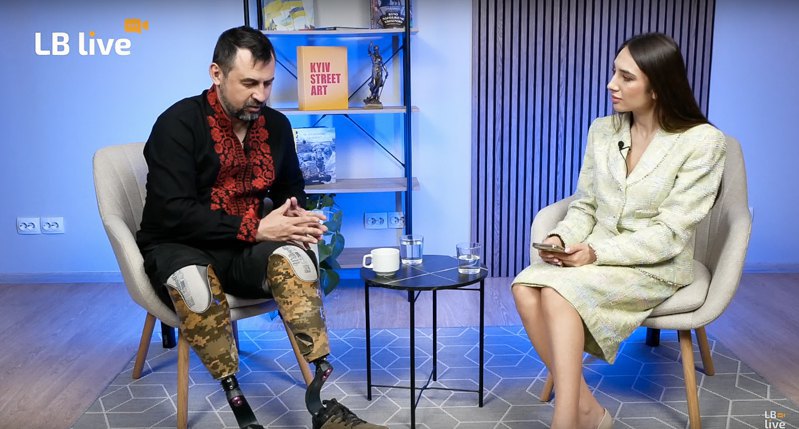
Of course, I have someone to defend. So when on the first day of the war, tanks appeared under my house and the tankers said: ‘Leave,’ we left for Makariv district. And on the sixth or seventh day, we were already surrounded.
We were driving along the Zhytomyr highway through Russian checkpoints. And I saw civilian cars that had been shot for only one purpose - robbery. Because people were leaving, taking valuables, money, jewellery with them, and they were simply robbed.
And the orcs did not shy away from anything. They shot women and children when they robbed cars. So when I told my wife at home that I was going to join the Territorial Defence Forces, there was no doubt. And my wife is definitely proud of my choice, and I am also proud that I had the honour to defend Ukraine.
Are your children proud too? You have two children, right?
Yes, they are wonderful children - Matviychyk and Nastya. Matviychyk is eight, and my daughter is her dad's pride: she speaks Chinese, English, maths, guitar. She is a gifted child.
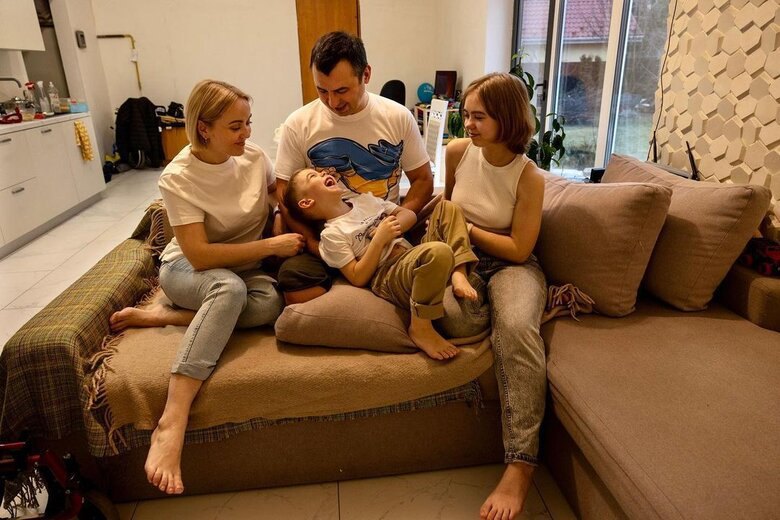
‘If we do not support our own, we will have to support the Russians’
At what point did you join the Territorial Defence Forces?
We left the encirclement, and I was sure that the orcs (Russians) would not enter Kyiv. We returned home. Then I went to the first, second, and third brigades and managed to negotiate. It was very difficult, because when we were leaving for Mykolayiv from our deployment point, there were 203 people in our company. We should have been a little more than 90, so we were more than twice as many. I know for sure that the major hid his officer's card just to be in the trenches. There were a lot of officers and soldiers.
Why do you think there was an overabundance then, there were a lot of volunteers, and now it is so difficult to find motivation to go and defend the Motherland?
I think that, unfortunately, it's corruption and a lack of our propaganda, so to speak. I'm sure it should work 24/7. It should tell us what bonuses, what perks, and the status of a military man should be constantly maintained. Our media, politicians, and bloggers have to work and work to support our Armed Forces. In fact, if we do not support our own, we will have to support others.
As a veteran, what is your attitude towards such men?
I have a specific attitude. I understand that there are people who earn money, pay taxes, support the army and do good deeds. These are some of them. And there are, of course, others, and they need to be ‘inspired’ in a different way.
Unfortunately, some of the guys have been in the trenches for three years, and they have even stopped counting their contusions. And if they burn out, who will replace them?
So I think everyone should work. And the army should be one hundred per cent voluntary. I would definitely not want to be in a trench with a forced conscription - it's not normal. Everyone should be motivated and provided for 100%.
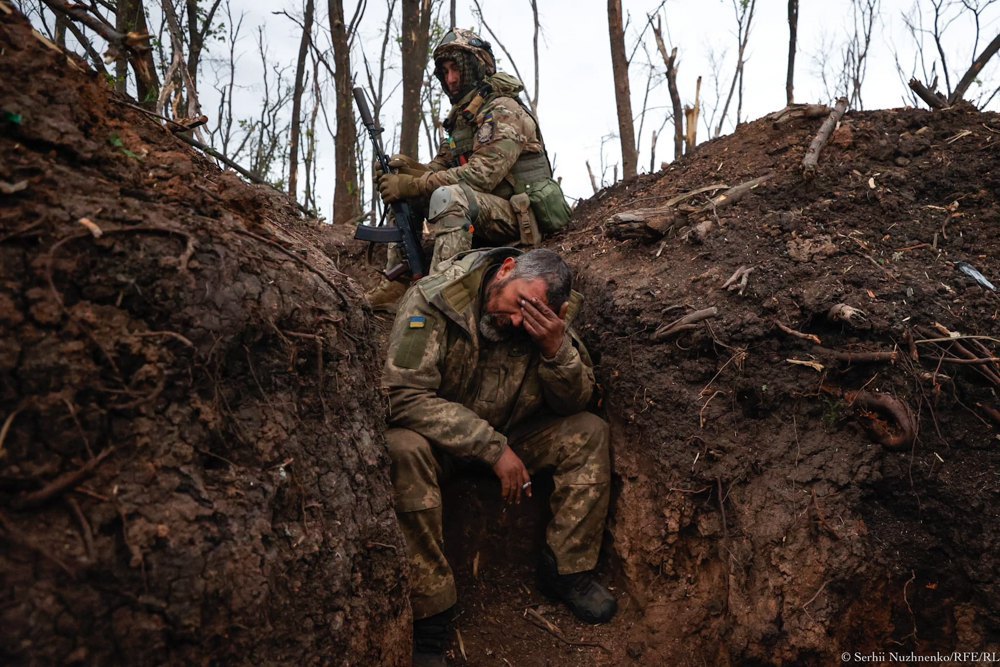
‘I didn't lose consciousness and thus saved the lives of my comrades and my own’
Were you immediately assigned to the Kherson sector?
At the end of March, we took the oath, and a few days later we were in Mykolayiv Region, and then in the Kherson sector. There, Chornobayivka was visible in the field 16 km away, so we could hear everything.
Did you see how the Russians kept coming there non-stop?
Well, I saw how our guys kept pounding them. Our own task was pretty modest: we were guarding the triple sevens (M777 — the British-American towed howitzer with a 155mm barrel. — Ed.). From our positions, the artillery guys would just roll in, fire, and roll out.After a few months, we found ourselves in Kherson, in the red zone. We were on the zero line, carrying out combat orders from the command. We rattled the orcs so hard they thought an offensive was coming from our direction.I'm not ashamed to say I was there.
You didn't even have the opportunity to undergo any training.
We had training: we went to the training grounds from the position. You don't stay in position 24/7. You are at the position for a few weeks, and then you go out for three or four days to eat and sleep normally. Because the fire was very heavy.
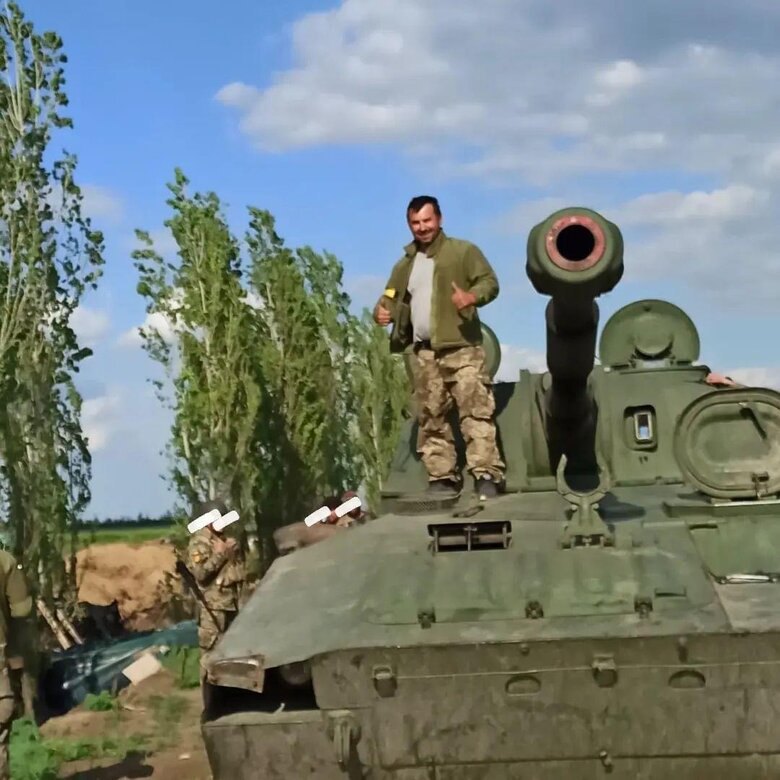
The 206th Battalion of the Territorial Defence Forces was directly involved in the liberation of Kherson Region for 8 months. As you said in one of your interviews, you were redeployed to another area in just a week. Please tell us how you managed to liberate the Kherson Region.
It was very active fighting. And, of course, we had been waiting for this victory for quite a long time. When we were already at the very bottom of the battlefield in Kherson Region, we were advancing 50-100 metres every week. We just kept propping them up. And in fact, it was only thanks to the cohesion of our military and competent leadership that all this happened. It was something truly incredible, especially for civilians. We did not expect that our army, which is three times smaller than the Russian army, would be able to do this.
You were an ordinary soldier, and what did you become when you were injured? How did you manage to do that?
I became a squad leader. And sometimes I performed the duties of a platoon leader. I think it was the desire to do it. And probably a little bit of education.
Tell us how you were injured in 2022 in the Kherson Region.
It had been raining so hard for several weeks that the black soil looked like porridge. Then the weather cleared and we were about to receive a Mavic. I arrived at the position to get my Mavic in the red zone. And at that moment, a 120 mm mine came: the shelling started. The first mine was a direct hit. My three comrades were killed instantly. I called for evacuation. My comrades from the battalion, the mortar men, responded. They came to get us out under mortar fire. Because the Russians continued mortar shelling after they hit us. When I was already in hospital, my wife was removing black soil from my ear.
I didn't lose consciousness and thus saved the lives of my comrades and my own. Because there was a very large loss of blood and the guys could have thought that I was done and would have stopped providing medical care. Unfortunately, I know a lot of examples of guys being rescued from black bags.
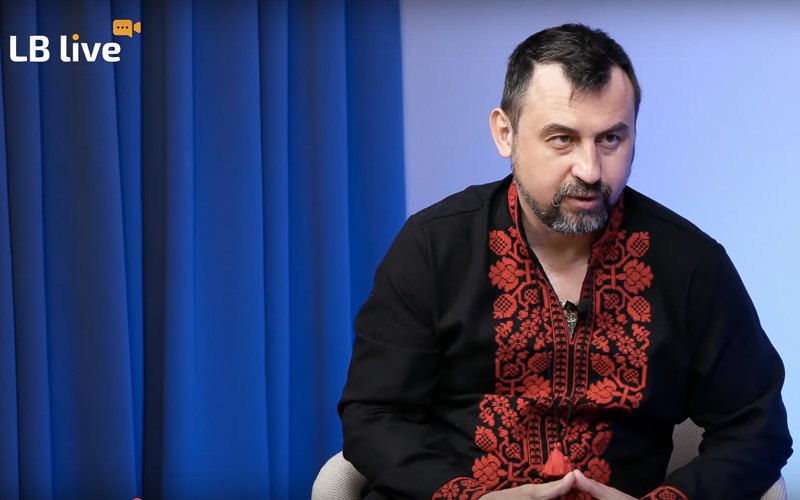
‘I come to hospitals and show by my own example that it is possible to live with two prostheses: to dance, run, dive and drive a car.’
Artem, let's talk about the path of a warrior. Firstly, there is your project (we are talking about The Ukrainian Veterans Foundation - Ed.). And I would like you to tell us about the process from the moment of injury to prosthetics: what happens, how the rehabilitation goes.
I come to hospitals and show by my own example that it is possible to live with two prostheses: to dance, run, dive and drive a car.
Once, a very young guy was sitting on the porch crying. I said: ‘Are you crazy? You're not dead.’ He said: ‘I don't know how to go on.’ I said: ‘Look at me, I'm running, dancing, here's the car’. And the next time he shouts in the corridor: ‘Tyoma, hi’. He already has a smile on his face. I think this is a very big deal.
After being wounded, you need to come up with a dream for yourself - and then turn it into a goal and go for it. For example, a hike to Hoverla, a trip to the sea or something else.
Was it the Boston Marathon for you?
Yes, and it was also an accident. A month after I was injured, the doctor came to see me and said: ‘You have to run in six months’. I opened my phone and for some reason remembered the Boston Marathon. I know for sure that I did not lose consciousness and did not die only because of my good physical condition. That's why this sports idea was the right one.
By the way, two years have just passed - on 17 April 2023, I ran a marathon. The prostheses were not yet permanent and not running. I put the girl in a wheelchair and, holding on to it, took those few steps at the Boston Marathon. It was probably the most unrivalled experience of my life!
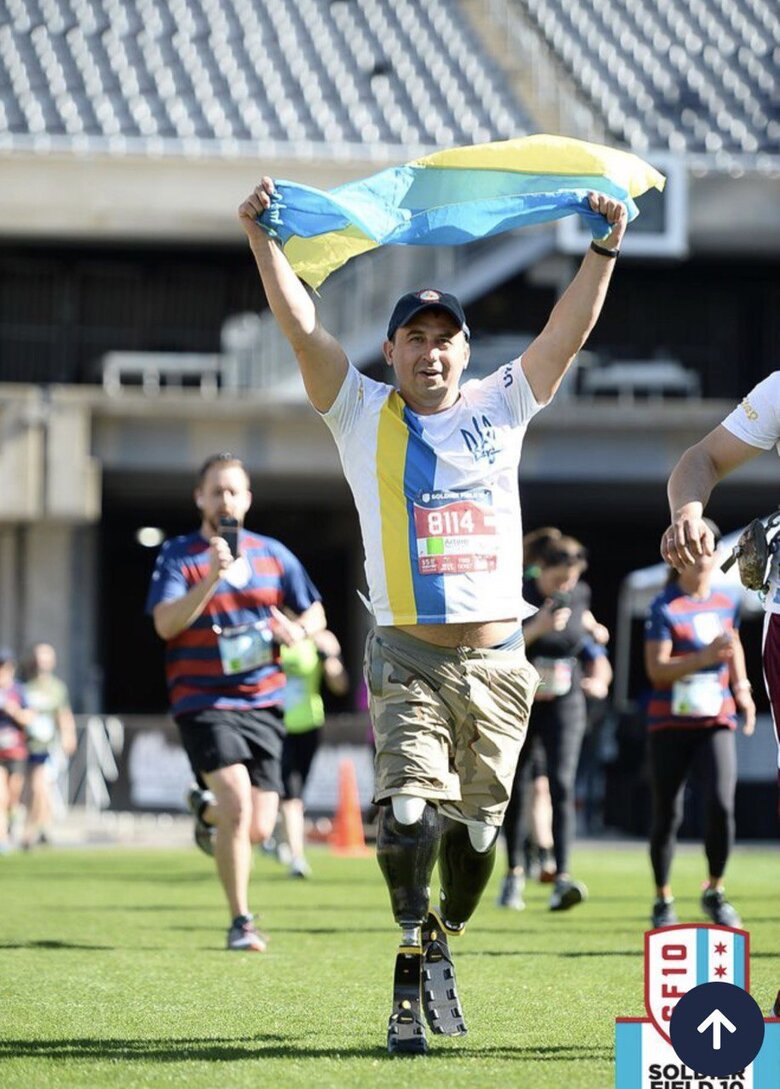
I have very short stumps and a complicated case, and I was lucky enough to get prosthetics in America. In some cases, our domestic prostheses may be suitable, but if you don't have a knee, it's better to go abroad.
How long did it take you to get prostheses?
I am, as the doctors told me, more of an exception to the rule. And I wanted to get fitted quickly, so it took me two and a half months. Sometimes a year goes by and guys can't get on prostheses. I also had colloidal scars: they were excised and sewn up. But, thank God, everything is fine, we are enjoying life.
‘There are not very conscious compatriots who become multimillionaires on our bones’
Tell me, please, Artem, how do you find investors or some kind of funding for prosthetics in the US? Perhaps you can give some advice?
My wife dealt with this issue - she just wrote letters to all the funds. Frankly, you have to be very careful, because there are not very conscious compatriots who become multimillionaires on our bones. That is why we need to be very selective and purposeful in finding and selecting those who will provide prosthetics. There are also fraudsters in charitable foundations, and unfortunately, there are a lot of them.
How long did you stay in the US?
At first, two and a half months. Then another month, when I had a prosthetic after a year and a half. They quickly left the lower part and just redid the upper part - that was it. It was very fast.
What kind of attitude did you feel from the Americans?
In America, they are very proud of their veterans. That's why they don't distinguish you from their veterans until they start talking to you. There is a lot of respect from the Americans! And when we danced, at every event, the entire audience would stand up during our performances.
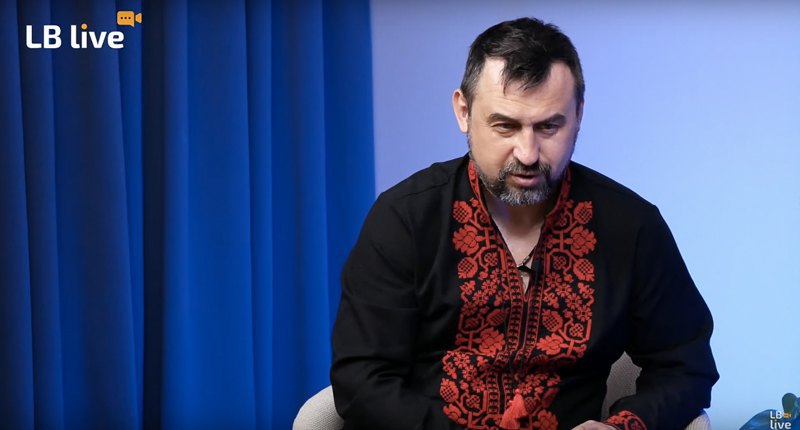
Tell us about dancing. Because I know you weren't particularly into it before.
For me, dancing was a complete mystery to me. But we were invited to an event, and my wife and I came to watch. Then I called the organiser of Big Dance and said: ‘’Bohdan Petrovych, can I try it? He said: ‘Of course, I'll find you a coach’.
Did your doctors even allow you to run the Boston Marathon and dance?
It's not forbidden. If it's not painful and doesn't harm your health, you should definitely do it. At the end of October, we ran the Marine Corps Marathon in Washington, D.C., and I almost crawled. I covered that distance without an assistant, without a wheelchair, but I'm definitely not going to freak out like that again.
Is this a challenge to yourself?
I won't do it again - it's nonsense. You need to exercise and keep healthy, but not to the detriment of yourself. It's just that later blisters and wounds appear in the stump, which begin to fester, and everything hurts. Excessive exertion does not lead to anything good.
I know you have another hobby - diving.
I have a guy from my old job who goes diving and said: ‘We want to try it, and you are our pilot project.’ I said: ‘Sure, let's do it’. We had eight dives in the pool and four in the Malyn quarry in Zhytomyr Region. I liked it very much, it was very cool! I couldn't imagine that the water was so clear and there were fish at a depth of 12-15 metres. Now I want to dive where there are more corals and beautiful fish. I really want to go to the sea.
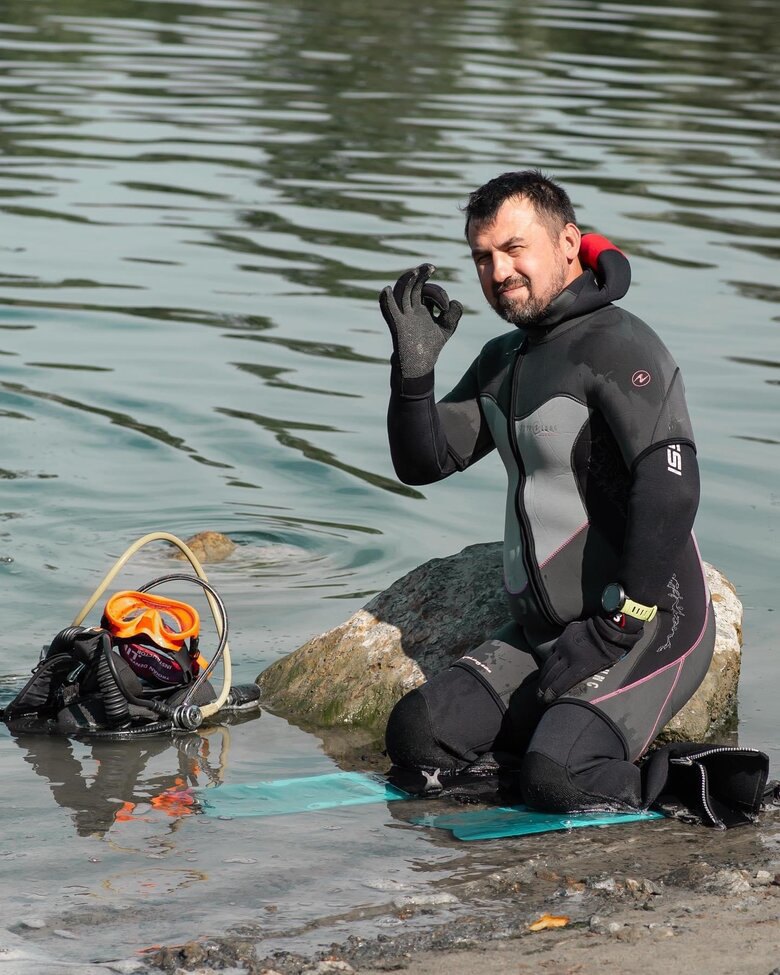
‘The guys will come back from the war a little shell-shocked - they will be educating unaware citizens’
I would also like to talk about accessibility for people with prostheses and wheelchairs. Unfortunately, Kyiv is not very accessible in this sense. What problems do you face?
The biggest problem is with parking spaces. There are some very unaware citizens who park in spaces for people with disabilities. These spaces are wider. When you open the car door, you can't get through. If another car is parked there, you certainly can't do it. But the guys from the war will all come back a little shell-shocked - they will be educating the unconscious.
I also wanted to ask you about the meetings in hospitals. What other support do you provide to the guys, besides your own example? Perhaps there is some other psychological help?
The guys ask me where I had my prostheses and which ones are better. And I tell them where, what and how by my own example. I also see the results of the work. I have actually seen the work of all prosthetic centres and probably know most of them personally - everyone is trying to help our guys. And there is also a legal issue: I tell them what to do.
What is needed to improve prosthetics in Ukraine? Do we lack funds or specialists?
I think we need specialists. Unfortunately, there are a lot of wounded guys, and good prosthetists are in short supply. And some of them still manage to give them summonses. Well, you definitely shouldn't do that. But in general, I think if a prosthetic centre is not suitable, change it. It's all available.
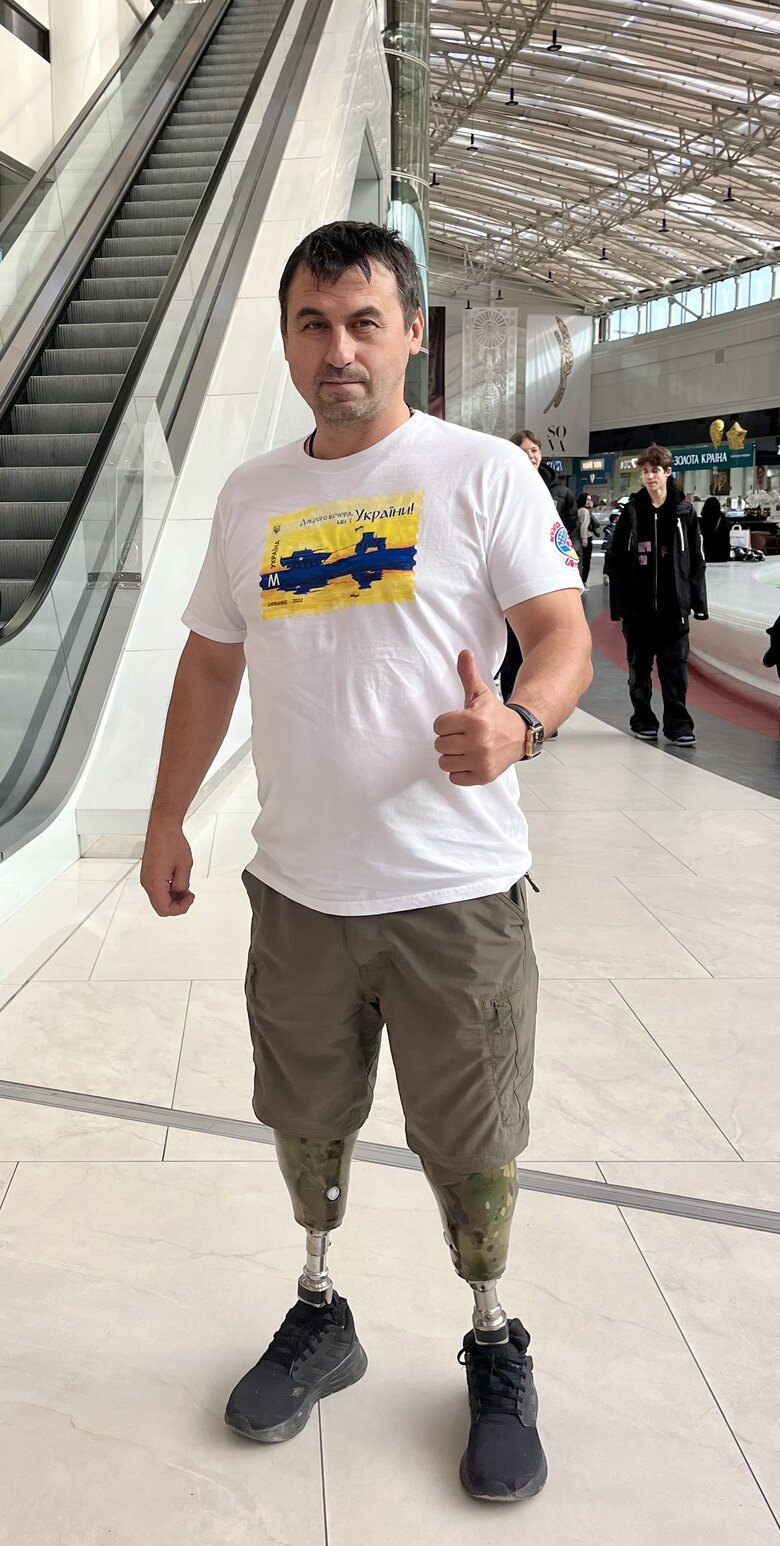
In fact, yes. Look, anyone can apply. I try to tell my brothers-in-arms that I am involved in many projects: dance, staging, and veterans' theatre. I'm a member of the National Association of Veterans of the Territorial Defence Forces of the Armed Forces of Ukraine, which was founded by our commander - we unite and help all our brothers in arms with words and deeds. And anyone can join our union, having a military ID card.
Since you are still an active serviceman, why did you decide to continue your service? After all, in principle, you can already work in your construction industry.
Well, it was very spontaneous. When I came back from prosthetics, I went to the military medical commission located in the central hospital. I thought, why not go to the next building and visit the guys. And at first, frankly speaking, it was very hard: unfamiliar guys with severe injuries, with drains, without arms, legs, eyes - and their wives by their side. It was hard for me at first. And then, when I saw the result, when I saw the smiles of the girls and boys, I realised that this is what we need to do.
Unfortunately, my late commander Biba, the commander of the 206th battalion, found out about this. He said: ‘Then we will keep you in the service’. Unfortunately, the commander passed away. But I am doing what I do - there was a petition to Zaluzhnyy about my further service.
‘If we haven't lost in the first three days, we have already won. We have to go all the way!’
Now there are some talks about a truce with the US and Russia, and European countries are also involved. What do you think about all this?
There is a lot of behind-the-scenes manipulation going on.. And, unfortunately, I see how they just want to write us off. This is, of course, very bad. But we definitely need to unite and do our own thing. Look, we didn't lose in the first three days when we really could have. And if we didn't lose then, then we have already won. This is my personal opinion. We have to go all the way. Yes, unfortunately, the losses are very high. And, unfortunately, we all pay with our blood for our victory. But there are no other options.
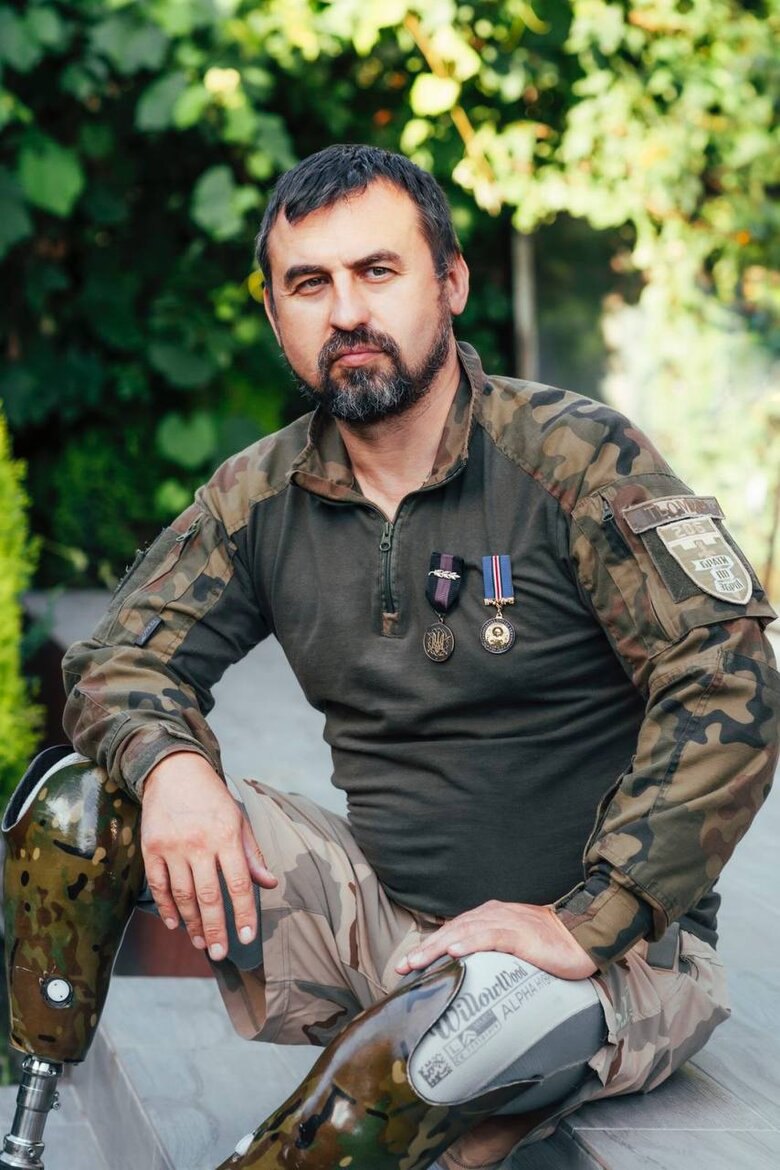
Frankly, I really want to get into the Paralympic team.
And what about dancing?
Dancing is already a routine, so to speak. We start preparing a new dance two or three times a week. And on the third of May there will be a small festival in Bucha, you can look for it. Well, in general, we will also surprise people, that's for sure. We have a lot of tours planned.
What do you dream about?
Of winning, of course. Of victory and of a holiday in our land. Let's hope that this will come true in the near future, but it depends on us first and foremost. I am from the wonderful city of Dnipro. I spent my childhood in Crimea, so Crimea is a part of my soul. My childhood memories are the sweetest. When we were students, we used to go hiking with backpacks, and we used to go all over the place. So we are arranging the next interview in Crimea.
I will be very happy if it happens. Thank you for protecting us. Thank you for inspiring all Ukrainians. Not only the military, not only veterans, but all Ukrainians. You are a great role model. I wish you good health and the realisation of all your plans. Glory to Ukraine! Glory to the heroes!








